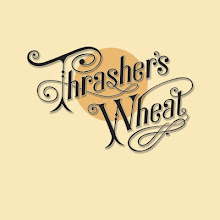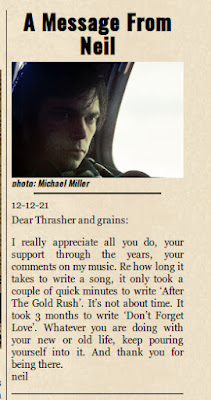NYA Question of the Moment: Riverboat Recordings
Mindblowing details continue to emerge on the forthcoming Neil Young Archives.
From yesterday's Archives Guy Q&A Session: Tuesday, 5/26, Steven asked:
We know that Neil and the rest of the team want the very best sound possible, but with the variety of studios, equipment, etc. that the original recordings were made at/on/with, was attention paid to getting the music on the Archives pitch perfect? Songs that are sped up or slowed down (with the exception of Expecting to Fly) drive people with perfect pitch crazy.
To which Archives Guy Q& replied:
In particular, the Riverboat disc needed a lot of work to correct speed and pitch issues.
Here are some details on that process:
This Archives Blu-ray/DVD disc has been compiled from the original 2 track, ¼” analog Riverboat master tape reels, which were recorded at 15ips.
The HDCD® 24-bit 192kHz digital transfers were edited into an assembled program and then sample rate converted to 24-bit 96kHz for audio restoration after it was discovered that the original recordings had varying and uneven speeds.
Through the series of performances, tape speed was found to vary 4% overall and at times as much as 2% during the course of a single song. Audio restoration techniques solved these inconsistencies and brought the program to correct pitch.
After the speed correction process was completed, the audio program was then edited and mastered at 24-bit 96kHz, becoming the DVD master.
In the case of Blu-ray, the audio program went through a final upsampling after the 24-bit 96kHz mastering. This final stage, utilizing a Pacific Microsonics HDCD® Model 2 processor, resulted in the 24-bit 192kHz Blu-ray master.
From Archives Guy on 250+p book:
- Art direction and design: Gary Burden & Jenice Heo for R. Twerk & Co.
- Photographs, artwork, text and credits researched and compiled by Joel Bernstein
- Production: L.A. Johnson
Also, see Unique NYA Moments.
Stay tuned for more Archives Guy Q&A!































 Human Highway
Human Highway

















 Concert Review of the Moment
Concert Review of the Moment





 This Land is My Land
This Land is My Land

 FREEDOM In A New Year
FREEDOM In A New Year









 *Thanks Neil!*
*Thanks Neil!*




![[EFC Blue Ribbon - Free Speech Online]](http://www.thrasherswheat.org/gifs/free-speech.gif)











 The Unbearable Lightness of Being Neil Young
The Unbearable Lightness of Being Neil Young Pardon My Heart
Pardon My Heart



 "We're The Ones
"We're The Ones  Thanks for Supporting Thrasher's Wheat!
Thanks for Supporting Thrasher's Wheat!




 This blog
This blog 
 (... he didn't kill himself either...)
#AaronDidntKillHimself
(... he didn't kill himself either...)
#AaronDidntKillHimself









































































 Neil Young's Moon Songs
Neil Young's Moon Songs




 Civic Duty Is Not Terrorism
Civic Duty Is Not Terrorism Orwell (and Grandpa) Was Right
Orwell (and Grandpa) Was Right


 What's So Funny About
What's So Funny About 



8 Comments:
Does this mean that the Archives version of "Mellow My Mind" will also be pitch-corrected?
And After The Gold Rush?
Although ya know...it doesn't matter when something is that Good!!
LIVE RUST
I'd submit that in this instance, the DVD of "Riverboat" would sound more true to the tape than the Blu-Ray, given that the DVD went through fewer DSP steps.
The first downsample to 48/96 prior to pitch restoration basically removed all the additional info that 48/192 offers.
And then the re-conversion back to 48/192 at the end would either induce harmonics or noise.
This is usually the "ugly secret" with 48/192. But the noise of a good dither might actually make for a more pleasant listening experience if not a more accurate one.
Thanks for the Info, AG! But I've probably just cut off the flow of further info here :-(
Doonerak-
A couple of corrections.
1- It's 24/192 not 48/192 24/96 not 48/96.
I know that you know this, but others may not.
2- The upsampling was done internally in a Pacific Microsonics Model 2, perhaps the cleanest and most transparent sample rate converter available.
While there isn't truly any more information in this particular 24/192 than in the 24/96, the process wasn't some Pro Tools plugin or something.
-Archives Guy
I know this convo is dead now, but I wonder why they didn't master straight to 24/192. Actually I've wondered why they haven't done this in the past, although my guess is that processing technology hasn't quite caught up with the A/D conversion technology. As far as the upsample to 24/192 from 24/96, there isn't going to be any real gains in sound quality, but, if anything, there would be less noise (despite the lack of information). It's certainly not going to sound worse. And as far as I know, dithering isn't done with changes in sampling rate, but rather with changes in bit depth.
But anyway, on paper I'm a little disappointed that everything wasn't done in 24/192, but to be honest I can hear only about a 10% quality improvement of 24/192 over 24/96, versus about a 20-30% improvement of 24/96 over 24/48 and about a 40-50% improvement of 24/96 over 16/44.1. So, in real practice, the sound quality of this box is as good as the consumer can really get right now.
Archives Guy writes:
While there isn't truly any more information in this particular 24/192 than in the 24/96, the process wasn't some Pro Tools plugin or something.
Maybe this is a naive question, but did you use Autotune?
No!!! perish the thought of Autotune, -
Plangent Processes- pitch-corrects based on forensic deduction of the original tape machine's electronic signatures. Corrects the machine's wow and flutter and speed.
Just noticed this floating around ...
Actually plangent worked from 192/24 and 176/24 sources.
Impression is out there that the processing is native 96/24. In fact they prefer 192/24 and only work at lower rates at client request which was not the case here. Something is lost in translation in the tech discussion here. A minor point but worth correcting because it lends the impression that the process limits the overall quality which ain't right.
Post a Comment
<< Home